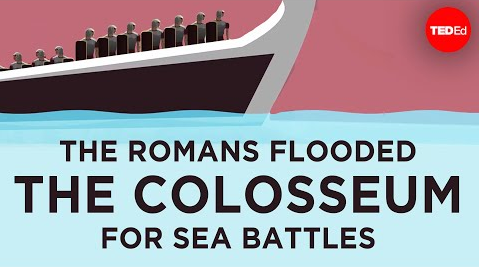The cry of the crowd. The roar of a lion. The clash of metal.
观众的欢呼声,狮子的咆哮声,还有刀剑交兵的铿锵之声。
Starting in 80 CE these sounds rang through the stands of the Colosseum.
自公元80年,这些声音常在古罗马竞技场回荡。
On hundreds of days a year, over 50,000 residents of Rome and visitors from across the Roman Empire
每年里有几百天,会有超过五万罗马居民及罗马帝国全国各地的游客
would fill the stadiums' four stories to see gladiators duel, animals fight, and chariots race around the arena.
坐满整个四层竞技场,来观看角斗士决斗,动物厮斗,以及环竞技场的战车大赛。
And for the grand finale, water poured into the arena basin,
而最后的节目是将水注入竞技场盆地,
submerging the stage for the greatest spectacle of all: staged naval battles.
淹没整个舞台,为所有人带来最壮观的景象:海战表演。
The Romans' epic, mock maritime encounters, called naumachiae,
罗马人史诗般的模拟海上遭遇战,又称海战表演,
started during Julius Caesar's reign in the first century BC, over a hundred years before the Colosseum was built.
始于公元前一世纪尤利乌斯·恺撒的统治时期,比罗马竞技场建成早了一百多年。
They were held alongside other aquatic spectacles on natural and artificial bodies of water around Rome
那时海战表演与其他水上表演一起进行,在罗马附近天然及人工水体上举行,
up through Emperor Flavius Vespasian, who began building the Colosseum in 70 CE on the site of a former lake.
直到弗拉维乌斯·维斯帕先皇帝上位,他于公元70年时在一湖泊的原址上开始着手建造古罗马竞技场。
The Colosseum was intended to be a symbol of Rome's power in the ancient world,
罗马竞技场旨在成为罗马在古代世界的权力象征,
and what better way to display that power than a body of water that could drain and refill at the Emperor's command?
还有什么比以皇帝之令掌控水位涨退更能彰显权力呢?
Vespasian's son Flavius Titus fulfilled his father's dream in 80 CE when he used war spoils to finish the Colosseum
维斯帕先的儿子弗拉维乌斯·提图斯在公元80年完成了他父亲的愿望,他用战利品来完成罗马竞技场的建造,
or as it was known at the time, the Flavian Amphitheater.
或是按当时的称呼来讲:弗拉维安圆形竞技场。
The grand opening was celebrated with 100 days of pageantry and gladiatorial games,
竞技场盛大开幕,足足举行了一百天的欢庆盛典以及角斗士比赛,
setting the precedent for programming that included parades, musical performances, public executions, and of course, gladiatorial combat.
开创先河,设计了一系列节目,包括游行,音乐表演,公开处决,当然还有角斗士决斗。
Unlike the games in smaller amphitheaters funded by wealthy Romans, these lavish displays of Imperial power were financed by the Emperor.
不似那些罗马富商所开设的小型圆形露天剧场的把戏,这些彰显皇权的奢华节目是由皇帝资助的。
Parades of exotic animals, theatrical performances,
设计异域动物游行、戏剧表演、
and the awe-inspiring naumachiae were all designed to bolster faith in the god-like Emperor, who would be declared a god after his own death.
以及令人惊叹的海战表演,都是为了强化对神一样的皇帝的信仰,而他将在死后被尊为神。
It's still a mystery how engineers flooded the arena to create this aquatic effect.
至于工程师们是如何水淹斗兽场来创造这种水战效果的,仍然是个谜。

Some historians believe a giant aqueduct was diverted into the arena.
一些历史学家认为是把一个巨大的渡槽改道引入竞技场。
Others think the system of chambers and sluice gates used to drain the arena, were also used to fill it.
另外一些认为用于排水的阀室和水闸系统,也被用来向竞技场注水。
These chambers could've been filled with water prior to the event
这些阀室在表演前就已蓄满水,
and then opened to submerge the stage under more than a million gallons of water, to create a depth of five feet.
之后只需打开就可以淹没舞台,需要超过一百万加仑的水,使场内水深达到5英尺。
But even with all that water, the Romans had to construct miniature boats with special flat bottoms that wouldn't scrape the Colosseum floor.
但即使已注入大量的水,罗马人仍要建造小型的平底船只,以免刮到斗兽场的地板。
These boats ranged from 7 to 15 meters long, and were built to look like vessels from famous encounters.
这些船长度为7至15米不等,且外型酷似著名战役中的船只。
During a battle, dozens of these ships would float around the arena,
在一场战役中,数十艘船会在竞技场中作战,
crewed by gladiators dressed as the opposing sides of the recreated battle.
船员由角斗士担任,打扮成当年战役中对立双方。
These warriors would duel across ships;
这些战士会在船上决斗;
boarding them, fighting, drowning, and incapacitating their foes until only one faction was left standing.
登陆敌船、与之战斗、淹溺对手并使之丧失战斗力,直到一方最终剩下。
Fortunately, not every watery display told such a gruesome story.
幸运的是,并不是所有的水上表演讲述的都是这样恐怖的故事。
In some of these floodings, a submerged stage allowed chariot drivers to glide across the water as though they were Triton,
在这些水上表演中,水下舞台使战车驾驶员可以在水面上滑行,像海神特里同一样:
making waves as he piloted his chariot on the sea.
在海上驾驶着战车,掀起层层海浪。
Animals walked on water, myths were re-enacted by condemned prisoners, and at night, nude synchronized swimmers would perform by torchlight.
动物在水上行走,被判刑的囚犯重演神话,晚上,裸体花样游泳运动员将在火炬的光照下表演。
But the Colosseum's aquatic age didn't last forever.
但是古罗马竞技场的水上时代没有维持下去。
The naval battles proved so popular they were given their own nearby lake by Emperor Domitian in the early 90s CE.
事实证明,海战表演非常受欢迎,在公元90年代早期,多米蒂安皇帝曾在附近的湖中举行过海战演出。
The larger lake proved even better for naumachiae,
大湖泊更加适合海战演出,
and the Colosseum soon gained a series of underground animal cages and trap doors that didn't allow for further flooding.
而且不久竞技场安装了一些地下兽笼和暗门,于是不再满足注水条件。
But for a brief time, the Flavian Emperors controlled the tides of war and water in a spectacular show of power.
但是在这一短暂的时期内,弗拉维王朝的皇帝们在一场壮丽权力表演中,掌控着战争的胜负和水位的起伏。


